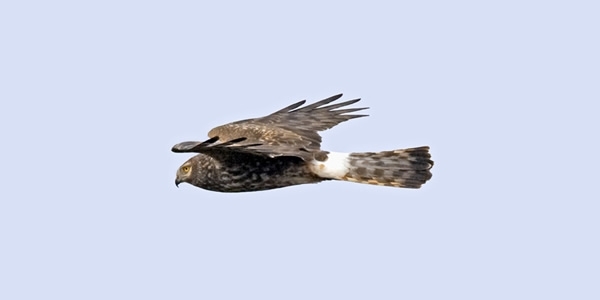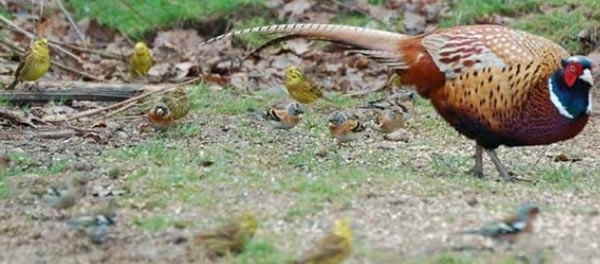
By Ian Coghill, GWCT Chairman
The RSPB trustees are so opposed to the plans to increase Hen Harrier numbers in the English uplands by a variety of means, including brood management and re-introduction, that since Defra and Natural England have not backed down and adopted the position demanded by the RSPB, they will use a fraction of their enormous resources to try to force them to do so by way of judicial review.
GWCT position on plans to increase Hen Harrier numbers
First, it must again be made clear that I and the trustees and staff of the GWCT are utterly opposed to the illegal killing of Hen Harriers. In my opinion, anyone who thinks about lifting a finger against a Hen Harrier would not only be engaged in serious criminality and compromising a rare species but committing the gravest disservice to grouse shooting and the manifest conservation and economic benefits that grouse moor management brings to the English uplands.
That said, it should also be made clear that the GWCT wholeheartedly supports:
1) the use of brood management to increase the numbers of Hen Harriers in England and
2) also supports the re-introduction of birds sourced from Europe into suitable sites in the south of England.
The RSPB is opposed to both these courses of action but, as yet, appears to be limiting the recourse to judicial review to the brood management element of Defra’s Joint Action Plan. Let us deal with that first.
Brood Management - some important points are misunderstood
1) Brood management kills nothing.
2) The eggs are not destroyed and the chicks are not killed.
3) They are reared to maturity and released into the wild.
4) The chances of reaching maturity will be greater for a brood-managed egg than one left in a natural nest.
Like all ground-nesting birds, Hen Harriers are subject to predation by the full suite of mammalian and avian predators. The nature of the nest site, and the long time the chicks stay in it, makes them particularly vulnerable to predators like foxes and stoats that hunt by scent, but they may also be killed by a wide range of avian predators ranging from corvids such as carrion crows and ravens to eagles and peregrines.
So what is brood management?
- It is the removal of eggs or chicks from a nest site and looking after them until they are either ready to be returned to the nest as eggs at point of hatch, or released into the wild as parented chicks or mature, independent birds.
- Harriers are already successfully and repeatedly brood managed elsewhere in Europe. In France, this is done simply to enable farmers to harvest their corn.
- It is not a novel concept invented in England. We simply don’t know if it will work here for Hen Harriers, but a trial makes sense to the GWCT.
Brood management will not harm a single bird and, based on the best available evidence, will result in the managed broods having a substantially greater chance of reaching maturity than if they had been left in the nest.
Is this not what the RSPB do to help the spoon-billed sandpiper?
Yes. The spoon-billed sandpiper faces many challenges, including being trapped and shot for food and having its habitat polluted and destroyed. The eggs of this appallingly rare bird are taken from their nests in Asia and flown to a secure location in England, where they are hatched and reared. The survivors are then flown back around the world and released in the hope that they won’t be eaten or starve in degraded and polluted habitats.
Obviously, if you are taking the government to judicial review for licensing people to rear and release harriers a few miles from their natal site, doing brood management on a global scale yourself might be seen as hypocritical. Whilst the RSPB call this process “head starting”, it is very hard to see a difference to the proposed brood management – which also gives Hen Harriers a head start.
When I first looked at the project website, the gravest risk to these charming birds was “illegal killing”. Since then this reference seems to have disappeared. It is unclear whether this is because the RSPB has solved the problem on the other side of the planet, or whether such frankness might inhibit the plan to re-designate what seems to a lot of observers to be a clear manifestation of brood management.
Lack of clarity about RSPB’s position on brood management
- For years its position was that brood management would be acceptable once the English Hen Harrier population reaches a certain level. The level varied depending on who you were speaking to, but there was no indication that brood management was completely unacceptable.
- Conversely, there are statements a good deal more combative. One, for example, stated that: “The idea that brood management is about hen harriers is nonsense. It is about facilitating unsustainably intensive land management, which is destroying the uplands. To be clear, RSPB is implacably opposed to this.”
It is worth considering this important statement in some detail.
1) Brood management is part of a much larger Hen Harrier recovery plan, and it is intended to increase the numbers of Hen Harriers in England in a well-dispersed sustainable manner. To say that it is not about Hen Harriers is simply silly.
2) Brood management will not harm a single bird and, based on the best available evidence, will result in the managed broods having a substantially greater chance of reaching maturity than if they had been left in the nest. It is a trial, for goodness’ sake. Why not give it a chance?
Grouse moor sustainability?
The RSPB has, for years, been working in partnership with; the GWCT, Scottish Natural Heritage, the Buccleuch Estate, Natural England and others, managing 30,000 upland acres outside Langholm in the Scottish Borders, as a driven grouse moor, using all the techniques legally available to other moors including burning, gritting and predator control.
If these management techniques are “unsustainable” - why did the RSPB not say so when they were helping to run the grouse moor at Langholm?
It’s hard to see partnership at work when the biggest and most powerful partner threatens to go to court when others don’t follow its shifting policy position.
Reintroduction of hen harriers to southern England?
The RSPB’s opposition to re-introducing hen harriers, sourced from the continent, into southern Britain is bewildering. I am aware that many people will be as surprised as I was when I was informed by the RSPB that it is generally opposed to re-introducing missing native species. They have, so far, been involved in many successful reintroductions:
- 225 sea eagles - from Norway to Scotland (1959-2010)
- 93 red kites - from Spain & Sweden to England & Scotland (1989-1994)
- 80 red kites - from Wales to Ireland (2008-2010)
- 93 cranes - from Germany to Somerset (2010-2015)
- 100 cirl buntings – from Paignton Zoo to Devon & Cornwall (2004-2011)
- 100 corncrakes – stock from Germany and Scotland, reared at Whipsnade Zoo and released in Cambridgeshire & Norfolk (2003-2017)
- 200 great bustards – from Russia & Spain to Wiltshire (2004-2014 - 200 was the target)
- 75 golden eagles - from Scotland for re-introduction into Ireland (2001-2011)
Surely everything that can be done to produce more Hen Harriers should be done?
We are left with a curious situation where the main opposition to two key elements of a plan designed to revolutionise the fortunes of the Hen Harrier in England is coming from the RSPB. Surely something is wrong here.
All this anger is about a trial. Even if it works, there is no guarantee that it will continue into perpetuity. Whilst it is obvious that, if brood management results in a rapid increase in the breeding range and abundance of hen harriers there may be pressure to continue it, this is not in any way prejudged.
I can understand and share the frustration at the slow pace of progress in relation to English Hen Harriers, but surely that understandable and very human feeling should not get in the way of rational thought and action.
There exists an opportunity to create a step change in the fortunes of England’s Hen Harriers. Why not try to make it work?
Sign up to our FREE weekly newsletter

Join over 30,000 subscribers and keep updated on our latest research, events, news and fundraising work.